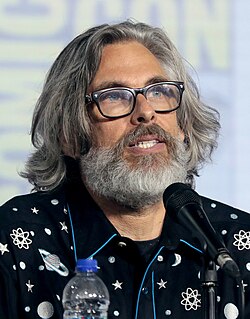Michael Chabon Quote
The Road is not a record of fatherly fidelity; it is a testament to the abyss of a parent’s greatest fears. The fear of leaving your child alone, of dying before your child has reached adulthood and learned to work the mechanisms and face the dangers of the world, or found a new partner to face them with. The fear of one day being obliged for your child’s own good, for his peace and comfort, to do violence to him or even end his life. And, above all, the fear of knowing—as every parent fears—that you have left your children a world more damaged, more poisoned, more base and violent and cheerless and toxic, more doomed, than the one you inherited. It is in the audacity and single-mindedness with which The Road extends the metaphor of a father’s guilt and heartbreak over abandoning his son to shift for himself in a ruined, friendless world that The Road finds its great power to move and horrify the reader.
The Road is not a record of fatherly fidelity; it is a testament to the abyss of a parent’s greatest fears. The fear of leaving your child alone, of dying before your child has reached adulthood and learned to work the mechanisms and face the dangers of the world, or found a new partner to face them with. The fear of one day being obliged for your child’s own good, for his peace and comfort, to do violence to him or even end his life. And, above all, the fear of knowing—as every parent fears—that you have left your children a world more damaged, more poisoned, more base and violent and cheerless and toxic, more doomed, than the one you inherited. It is in the audacity and single-mindedness with which The Road extends the metaphor of a father’s guilt and heartbreak over abandoning his son to shift for himself in a ruined, friendless world that The Road finds its great power to move and horrify the reader.
Related Quotes
About Michael Chabon
born May 24, 1963) is an American novelist, screenwriter, columnist, and short story writer. Born in Washington, D.C., he spent a year studying at Carnegie Mellon University before transferring to the University of Pittsburgh, graduating in 1984. He subsequently received a Master of Fine Arts in creative writing from the University of California, Irvine.
Chabon's first novel, The Mysteries of Pittsburgh (1988), was published when he was 24. He followed it with Wonder Boys (1995) and two short-story collections. In 2000, he published The Amazing Adventures of Kavalier & Clay, a novel that John Leonard would later call Chabon's magnum opus. It received the Pulitzer Prize for Fiction in 2001.
His novel The Yiddish Policemen's Union, an alternate history mystery novel, was published in 2007 and won the Hugo, Sidewise, Nebula and Ignotus awards; his serialized novel Gentlemen of the Road appeared in book form in the fall of the same year. In 2012, Chabon published Telegraph Avenue, billed as "a twenty-first century Middlemarch", concerning the tangled lives of two families in the San Francisco Bay Area in 2004. He followed Telegraph Avenue in November 2016 with his latest novel, Moonglow, a fictionalized memoir of his maternal grandfather, based on his deathbed confessions under the influence of powerful painkillers in Chabon's mother's California home in 1989.
Chabon's work is characterized by complex language, and the frequent use of metaphor along with recurring themes such as nostalgia, divorce, abandonment, fatherhood, and most notably issues of Jewish identity. He often includes gay, bisexual, and Jewish characters in his work. Since the late 1990s, he has written in increasingly diverse styles for varied outlets; he is a notable defender of the merits of genre fiction and plot-driven fiction, and, along with novels, has published screenplays, children's books, comics, and newspaper serials.
